Participating Students
Congratulations and welcome to our newly selected students!
- 2010-2011
- 2011-2012
- 2012-2013
- Christian Guzman
- Matt Hurst
- Sarah Pedersen
- Morgan Ruelle
- Asha Sharma *
- Dori Torres
- Joanna Upton *
- Jennifer Zambriski
- * FSPR IGERT Associate
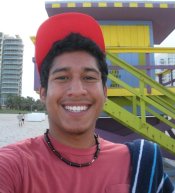
Christian Guzman
Biological & Environmental EngineeringBS: Agricultural and Biological Engineering, University of Florida, 2009
I became interested in Land and Resource Engineering after a summer trip to Ecuador where I was made well aware of the blessed water resources and technology we have in the US in contrast to developing countries. I am very interested in the close relationship agriculture has with water resources and how each has a profound impact on the security of the other. Some general research themes I hope to pursue in my dissertation are enhancing the infiltration capacity and health of soils to improve the efficiency of water usage in developing countries. Furthermore, I am interested to learn how engineers and other volunteers can develop water systems that are capable of obtaining quality, low maintenance, and sustainability in participation with communities.
Interests: My passions outside of academia are dancing salsa, going to the beach, playing soccer, riding my bike, reading the bible, spending time with my family, eating oranges, and sketching.
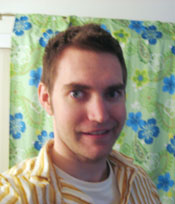
Matt Hurst
Civil & Environmental EngineeringBS: Chemistry and Civil Engineering, Rose-Hulman Institute of Technology, 2007
MS: Civil and Environmental Engineering, Cornell University, 2009
I wanted to find a graduate program where I could integrate my sense of social justice with a strong technical foundation in the environmental field. I was initially very attracted to AguaClara, a project directed by Dr. Weber-Shirk in Civil and Environmental Engineering, because of the vision to provide a design for affordable, gravity-driven surface water treatment plants for small communities that could be implemented by partner organizations. I conducted my masters and will continue my doctoral research specifically investigating the use and optimization of a floc blanket, a specific sedimentation process in water treatment plants. I was very fortunate to have had the opportunity to visit these plants constructed in Honduras and see their positive impacts on communities. I hope through IGERT, that I can understand better the complex relationships inherent in food production and distribution and contribute my knowledge in water quality.
Interests: I enjoy cooking, swimming, camping, and hiking.
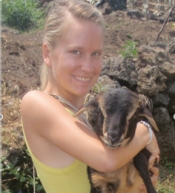
Sarah Pedersen
NutritionBS: Psychology, Brown University, 2004
MS: Food Policy and Applied Nutrition, Tufts University, 2009
I grew up on my family’s farm in rural upstate New York. During my time at Brown, I studied abroad for a year in Copenhagen, Denmark and undertook an independent research project on diversity in child development by studying the interactions of Danish and immigrant children in a kindergarten in Copenhagen. I was also able to gain clinical medical experience through a program at the University hospital in Copenhagen. After graduation, I worked as a research assistant in the pulmonary lab of Harvard’s Beth Israel Deaconess Medical Center in Boston, MA. During that time at the hospital, I realized that my dream of becoming a doctor wouldn’t satisfy my need to make a broad impact on the health of underserved populations. I subsequently enrolled in a Master’s degree program in Food Policy and Applied Nutrition at Tufts University. While a graduate student, I researched child obesity in Cuba. I also spent a summer as an intern with USAID in Rwanda designing and implementing a household socio-economic impact survey with rural coffee farmers. This past summer, I conducted field research on energy balance and nutrition in elite athletes in Rwanda. I will continue my studies as a PhD student in International Nutrition at Cornell
Interests: In my spare time, I am an avid diverI was a junior Olympic diver and a member of the Division I diving team at Brown University.
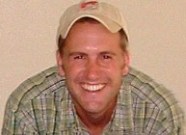
Morgan Ruelle
Natural ResourcesBS: Ecology & Evolutionary Biology, Yale University, 2001
MS: Natural Resources, Cornell University, 2010
As an undergraduate, I studied the conservation genetics of Galapagos tortoises and spent a semester in Kenya with the School for Field Studies researching grass composition and controlled burning in Nairobi National Park. I also lived on a Maasai group ranch studying the relationships between pastoralism, land tenure systems, and elephant conservation. I have worked for Olympic National Park, the Nature Conservancy of Wyoming, the Bureau of Land Management, and served as a Peace Corps volunteer in Armenia.
My master’s thesis at Cornell examined the role of indigenous plant knowledge in preventing diet-related diseases on the Standing Rock Oyate (Nation) in the northern Great Plains. My participation in the IGERT will allow me to integrate my interests in food systems, human ecology, plant knowledge, and community health. I am particularly interested in the effects of climate change on Ethiopian mountain communities, where shifts in altitudinal vegetation zones are requiring adaptations in land-use strategies. Since a diversity of non-cultivated plants provides communities with key micronutrients, I want to study the human ecological dimensions of tending and gathering food plants as communities respond to dramatic change.
Interests: I love trail-running, listening to stories, and am learning to fly-fish.
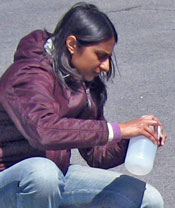
Asha Sharma
Biological and Environmental EgineeringB.Tech: Industrial Biotechnology, Anna University, Chennai, India, 2006
MS: Biological and Environmental Engineering, Cornell University, 2010
I grew up in Kolkata, India, a city known for its poverty but which also has a very rich culture. As an undergraduate, I did research projects in chronobiology, biophysics and enzyme engineering labs. While I learned much in these labs, I realised I was more interested in working on problems of a larger scale, specifically those related to our use of natural resources. For my MS thesis, I developed a novel biodegradable hydrological tracer that uses DNA as the identifying tag. In the last few years at Cornell, I have had the opportunity to broaden my interests though a variety of classes and interactions. As I pursue my PhD in Biological and Environmental Engineering as an IGERT Associate, I hope to study the interactions between food, energy and water resources in the light of climate change.
Interests: Playing the violin and drums, reading, and learning (almost) anything new.
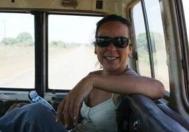
Dorisel (Dori) Torres
Soil and Crop SciencesBS: Chemical Engineering, University of Puerto Rico, 2000
BS: Horticulture, University of Puerto Rico, 2007
MS: Soils and Crop Science, Cornell University, 2010
I was born and raised in Puerto Rico. I decided to pursue an international career in Soil Sciences after working on an organic farm in California and serving as a volunteer for Global Services Corps in Tanzania. These work experiences helped me to realize the importance of tackling research questions and poverty-related problems from a multidimensional perspective. I did my MS degree on biochar production with pyrolytic stoves. I plan to continue to work on Biochar system, specifically looking into issues concerning resource availability, energy use and reduction of kitchen indoor air pollution and the effects of biochar applications to soil in different agro-ecological zones.
Interests: In my spare time, I like to practice yoga, hike and travel.

Joanna Upton
Applied Economics and ManagementBA: Linguistics, French, Music Theory (minor), Boston University, 2002
MA: Law and Diplomacy, the Fletcher School, Tufts University, 2008
As a student of linguistics and music, my initial interest in Africa related to language and society, as well as the role of education in promoting cultural empowerment and development. I first traveled to Niger to study there in 2001; I returned as soon as I could to work on my Hausa proverbs, do what I could to help and to learn, and backpack across West Africa. I eventually spent two years as the local administrator of a small non-profit working on primary education, HIV awareness, and poverty reduction programs with the nomadic Touareg of Northern Niger. My interests—and profound frustrations—migrated toward the fundamental issues of poverty and access to essential needs. I decided that I needed to return to school to even begin to understand the issues that really mattered and work toward making a difference. After four years in Niger, I decided to pursue a Master degree at the Fletcher School. I eventually turned my focus to the economics of development and found my niche here at Cornell working with Chris Barrett on food markets and poverty.
My current research program focuses on market institutions and mechanisms and the ability of markets to foster development and provide for people’s needs. I am determined to expand our understanding of how markets accomplish these objectives in sub-Saharan Africa, and especially of how they fail to do so. I am also interested in examining the role of policy, such as local and regional procurement for food assistance, in interacting with and supporting markets. I look forward to further expanding the interdisciplinary scope of my research through my involvement the IGERT program.
Interests: When I’m not wandering around in an African market or busy at the library, I spend my time enjoying the company of my friends and family (and charming cat), swimming in Ithaca’s lakes and gorges, cross-country skiing, educating myself about local wines, and playing the piano.
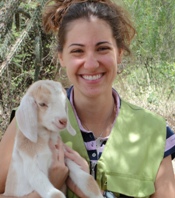
Jennifer Zambriski, DVM
Animal ScienceBS: Biology, Tufts University, 2000
DVM: Tufts University, 2006
Certificate in International Veterinary Medicine (concentration in Conservation Medicine): Tufts University, 2006
Since completing my undergraduate degree I have had the opportunity to become involved in a number of international research projects. I have studied Nipah virus in Malaysian fruit bats and tuberculosis in Asian elephants in Nepal. More recently, I was also involved in developing an Avian Influenza vaccination protocol in domestic ducks in Borneo with the United Nations Food and Agriculture Organization and conducting brucellosis research in dairy goats in Bolivia and Peru as a Fogarty International Clinical Research Scholar with the National Institutes of Health.
In general, my research interests lie in the fields of international agriculture and emerging infectious diseasesI plan to focus on Cryptosporidium parvum, a zoonotic diarrheal parasite of dairy calves, for my PhD research. I hope to continue studying the cross-over of domestic livestock and wildlife in resource-poor settings and the resultant impact on the health and welfare of people and animals alike.
Interests: In my spare time I love kayaking, cooking, and creating new names for OPI nail polish.
- Leah Bevis
- Jessica Bliss
- Soumya Gupta
- Rachel Hestrin
- Nathan Jensen
- Laura Morales
- Indrani Singh *
- Laura Smith
- Matthew Stasiewicz
- Brian Thiede
- Tigist Yazie Tebebu
- * FSPR IGERT Associate
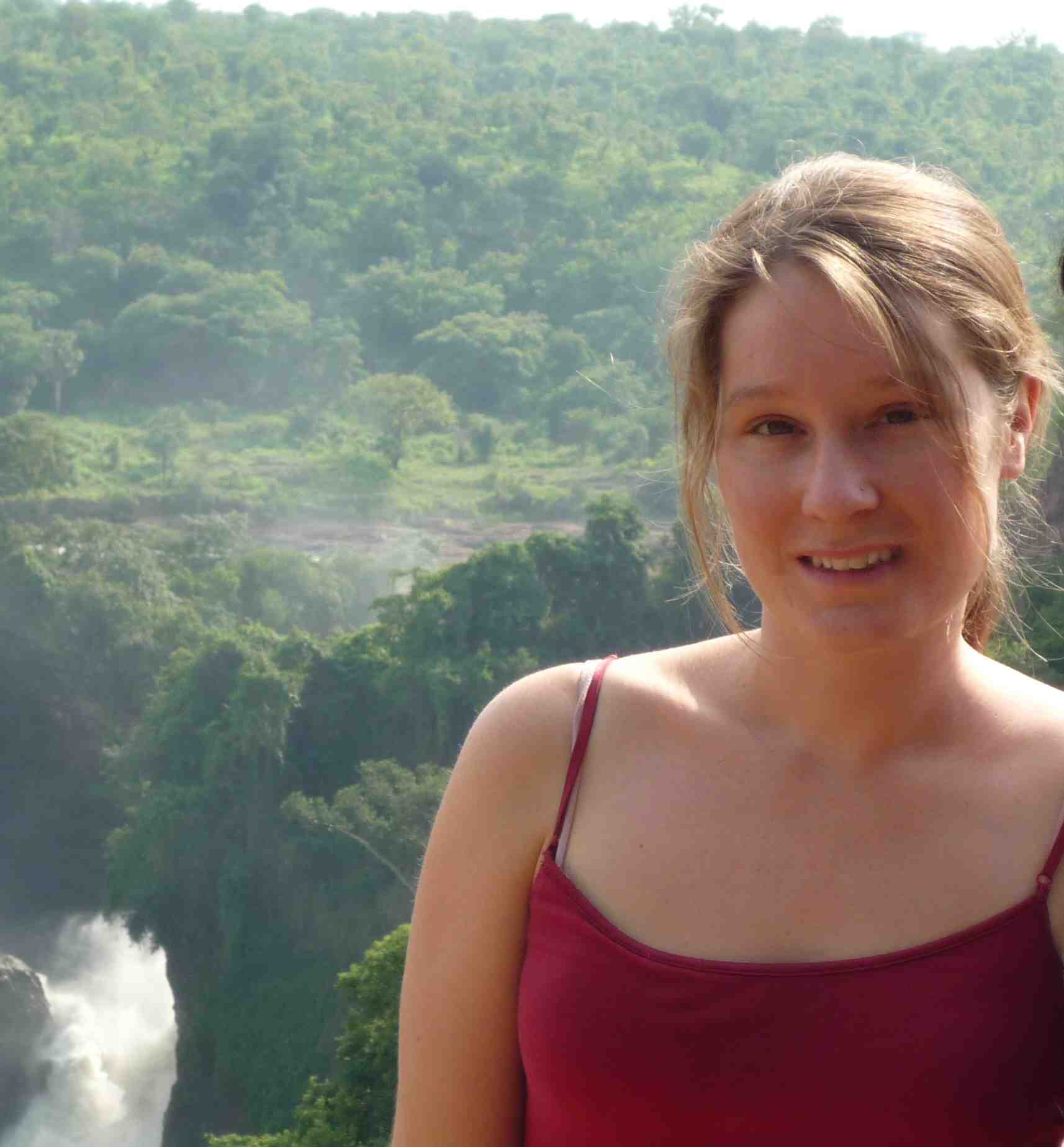
Leah Bevis
Applied Economics and ManagementBS: Geography, Middlebury College, 2009
I spent most of my first visits to East Africa doing story-telling projects, using either written word or radio as a medium. After finishing an undergraduate degree in geography at Middlebury College, I worked for a year running public health programs for a small NGO in rural Uganda. I loved this work, but felt that my programs did nothing to alter the structures that keep entire African communities or even countries in poverty.
I am interested in persistent poverty at the household level in Africa, and the systems that propagate such poverty ‘ particularly those nutritional, agricultural, educational, or climate-related. While I feel that economics is the best “tool” for me to tackle such issues, past experience and training have left me with a penchant for geographic/spatial analysis and a belief that knowing the stories behind numbers is crucial for making lasting change.
I spent the summer of 2011 in Ethiopia, designing a cash transfer evaluation for CARE Ethiopia. I plan to continue work with them this year, and am hopeful that my survey data will help me to examine issues related to intra-household food sharing in the pastoral community of Borena.
Interests: My personal interests include hiking and running, all activities with my little sister, farmer’s markets, chatting with workers of the informal sector, recording stories, all activities in the ocean, and cooking.

Jessica Bliss
NutritionBS: Environmental Science, University of Oregon, 2005
After completing my undergraduate degree I spent the following years working on community development and food security projects in Ecuador, Portland, OR, and Niger. I served as an AmeriCorps volunteer in Portland and as a Peace Corps volunteer in Niger; these jobs in particular, and the people I met through them, led to my interest and concern for hunger issues, generational poverty, and malnutrition.
Although it’s a little early to decisively say what my dissertation research will be, it will likely address the social and economic influences on women and children’s nutrition/malnutrition in the Sahel. I’m interested the role(s) and effectiveness of feeding programs for severely malnourished infants, as well as the functionality of women-managed grain banks.
Interests: My interests outside of school are numerous and pretty simple: I love dogs, running, being with family and friends, and doing the occasional crafty thing. I also love to dance, ride my bike, eat, read, and stay in touch with faraway friends.
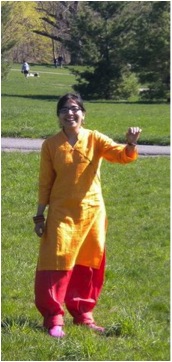
Soumya Gupta
Applied Economics and ManagementBA: Economics, University of Delhi, India, 2005
MA: Economics, Jawaharlal Nehru University, New Delhi, India, 2008
During my years as an undergraduate and masters’ student I researched issues of education, health and agriculture through my work with various national, international and grassroots level organizations in India. I came to realize that agriculture and nutrition are two crisis areas which the country is facing inspite of its economic growth. My research at Cornell is looking to identify pathways between agriculture and nutrition in the Vidarbha region of Maharashtra. I believe that while these are independent focus areas in themselves there is a scope to take advantage of the synergies that can arise from agriculture-based interventions to improve nutritional status. In that respect I view the IGERT as an opportunity to study the dynamics of food systems in a more comprehensive manner and one which ‘forces’ you (in a good way!) to do that with people from different disciplines. Moreover with its focus on Africa I feel it will allow me to appreciate the context-specific differences in the manifestation of, and solutions for, problems of food security and malnutrition which are faced by people in India as well.
Interests: Tap-dancing, hiking, sipping Chai (tea) in the sun, Calvin & Hobbes, watching movies and catching up with the ones back home.
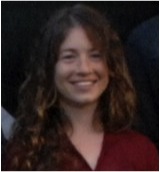
Rachel Hestrin
Crop and Soil SciencesBA: Geography, University of California-Berkeley
As an undergraduate, my research included rangeland management in the Middle East, organic viticulture in New Zealand, and sewerage development in the San Francisco Bay Area. After graduating, I spent four years farming in Michigan and in the northeast. My education and experience have inspired me to pursue a career in crop and soil science. While my dissertation research will likely focus on microbial and biogeochemical mechanisms, my interests are driven by the practical applications of research. I hope that by contributing to our scientific understanding of agriculture, I can help farmers improve soil management and achieve tighter nutrient cycling, thereby reducing inputs, increasing productivity, and ultimately helping to alleviate hunger, poverty, and environmental degradation. I believe that collaboration across disciplines and agencies is necessary and look forward to working with other FSPR IGERT students in order to address all aspects of global food systems and poverty reduction.
Interests: I enjoy working with my hands, being outside, playing music, cooking, and spending time with friends and family.
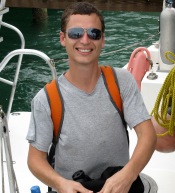
Nathan Jensen
Applied Economics and ManagementBS: Physics, Luther College, Iowa, 2003
MS: Agricultural Economics, University of Missouri, 2010
I spent two years living in Mali as a Peace Corps volunteer working with agricultural households in the Sahel. I loved my time and work there, but wanted to learn how to make a larger impact on poverty and food security issues. Since then I have helped manage vegetable gardens in Vermont and upstate New York and pursued an MS in Agricultural Economics at the University of Missouri.
I am currently interested in the livelihood strategies of agricultural households, their relative successes, and their impact on social and ecological systems. Much of this interest originates with my time in the Peace Corps, working one-on-one with farmers trying to solve food security problems while maintaining the integrity of their livelihoods, environment, and culture.
Interests: I enjoy pretty much any activity that takes place outside with friends and family, especially those that involve cookouts and badminton. I also enjoy board games and listening to people tell stories about their lives.
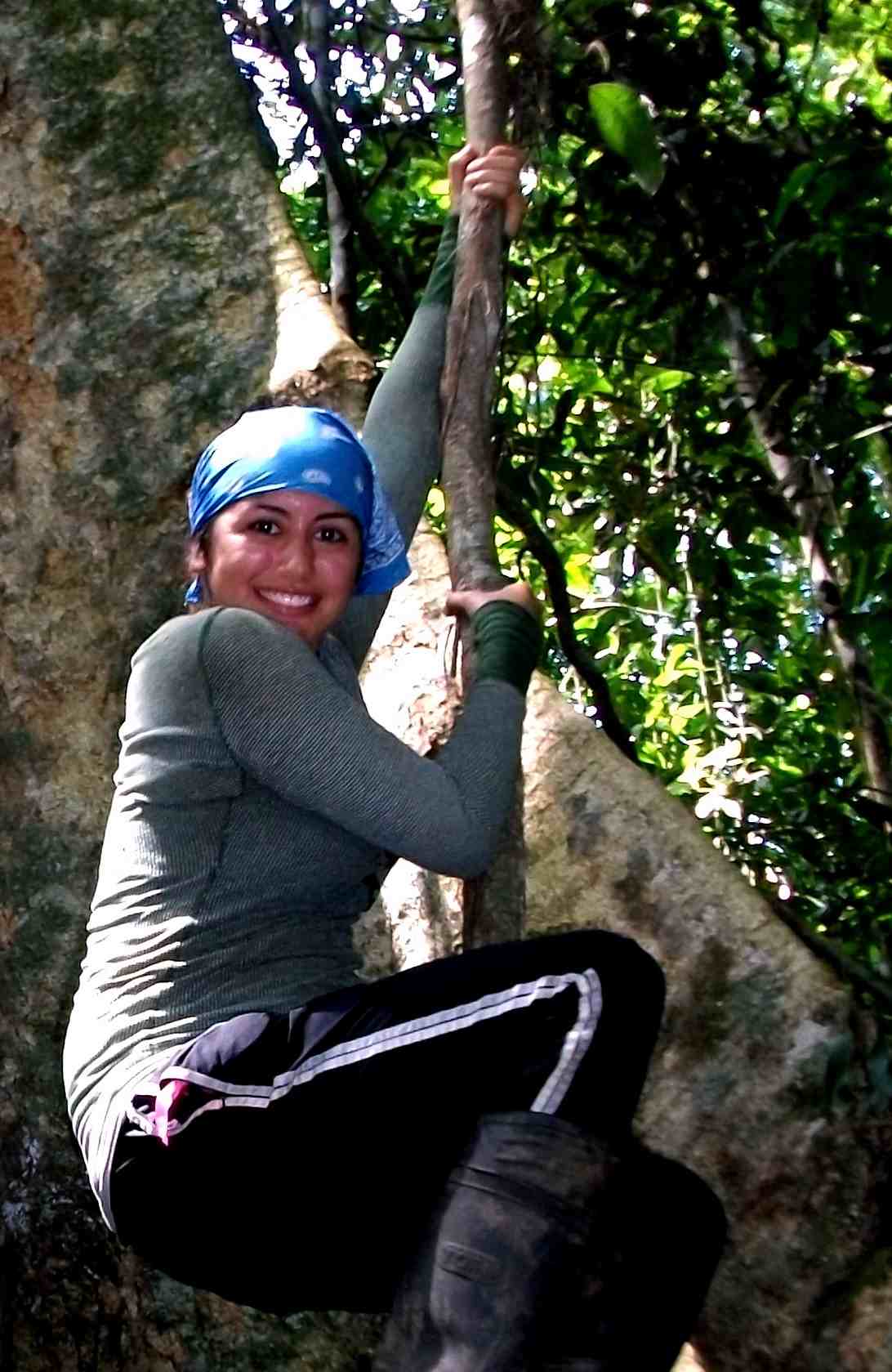
Laura Morales
Plant BreedingBS: Biology, University of Florida, 2011
My interest in plants sprouted my first semester at the University of Florida when I took a course called “Plants, Health, and Spirituality.” Plants, organisms that had previously seemed dead to me, were transformed into spectacular beings with the most fascinating mechanisms. However, my specific interest in crops grew exponentially when I started working in a lab that studied maize genetics and physiology. With the support of my advisor, I was given the opportunity to present my research at international conferences in Italy and Canada. I was first inspired to consider plant breeding for my graduate studies after hearing Dr. Marianne Banziger’s opening talk at the 52nd Annual Maize Genetics Conference, where she discussed breeding stress-tolerant maize for the developing world at CIMMYT, and I was further moved by the story of Dr. Gebisa Ejeta, the 2009 World Food Prize Winner. I dream of making a fraction of the impact that these people and organizations have made in improving the crops most important to the people who need it most.
I am very excited to start my doctoral work here at Cornell with the Food Systems and Poverty Reduction IGERT Program in Dr. Rebecca Nelson’s lab. I will be working on genetic disease resistance in maize, focusing on diseases that have a heavy negative impact on productivity in Africa. I also hope to understand the components involved in food production and distribution in order to make these resources as accessible as possible. I believe that this program will help me take the first step in my journey towards making an important contribution to our world’s crops and to the people who produce and consume it.
Interests: Being outdoors, traveling, experiencing new things, spending time with family and friends, goofing around.
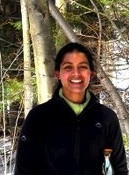
Indrani Singh
Ecology and Evolutionary BiologyBS: Biology, Grinnell College, 2008
My interest in food systems and poverty reduction is rooted in my fascination with the complex webs of connection between environmental stewardship, food security, and poverty reduction. I appreciate that providing communities with food security and means of livelihood is intricately connected with getting local communities involved with environmental stewardship. Presently I am interested in pollination in human altered landscapes. I would like to develop a better understanding of pollination services in urban landscapes (such as food crops in community gardens and ornamentals in gardens) and developing methods to maintain pollinator diversity in such landscapes. I would like to help implement management practices that can support pollinator communities in urban landscapes and also build public awareness of pollinators and their services.
Interests: Running, hiking, baking, yoga, dancing salsa and lounging with canines.
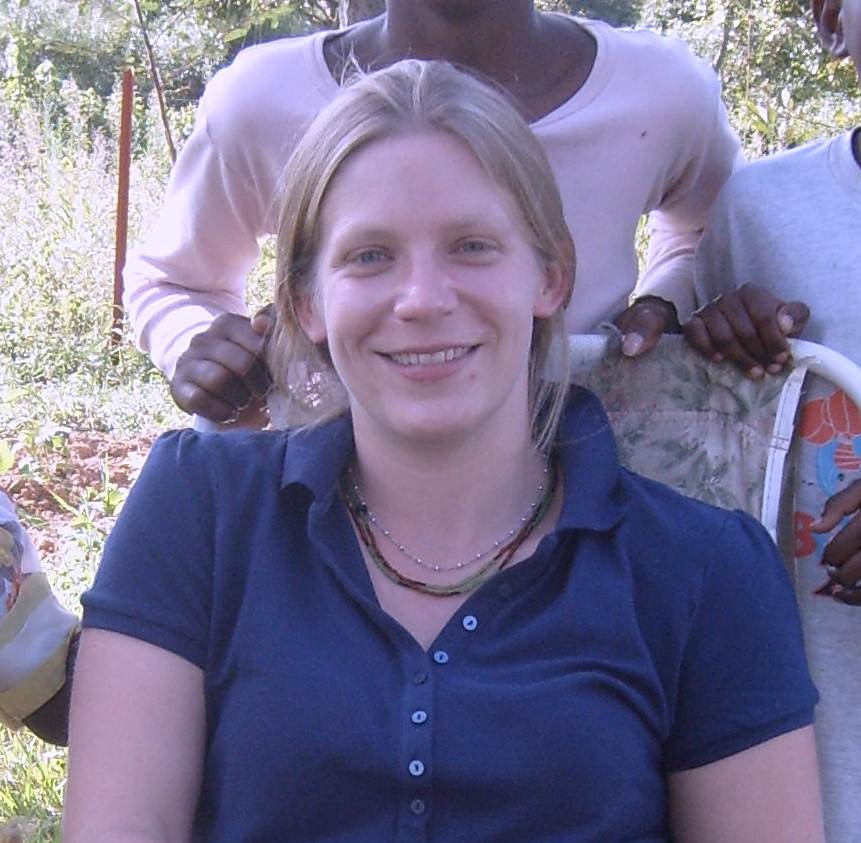
Laura Smith
Nutritional SciencesBS: Nutritional Sciences, Cornell University
Since completing my undergraduate degree, I have been working in nutrition and agricultural education and research in the United States and in East Africa. I currently work with a school in Western Kenya and a school in Newfield, NY on a sister school gardening project.
My career goal is to improve nutrition and health in rural communities, both domestically and internationally, by conducting basic and applied research on the food system. Specifically, I aim to address child morbidity and mortality by investigating the relationship between food chain mycotoxin exposure and nutritional outcomes in children. My research agenda is a part of the discourse about mycotoxin exposure, food contamination and potential outcomes of contamination and intervention which requires a systems approach involving fields of nutrition, biology, agriculture, economics and sociology.
Interests: I like adventure and like to travel or just go on walks with my dog. In addition, I am an avid gardener, and love to grow plants inside and out. I also like to cook, especially for other people.
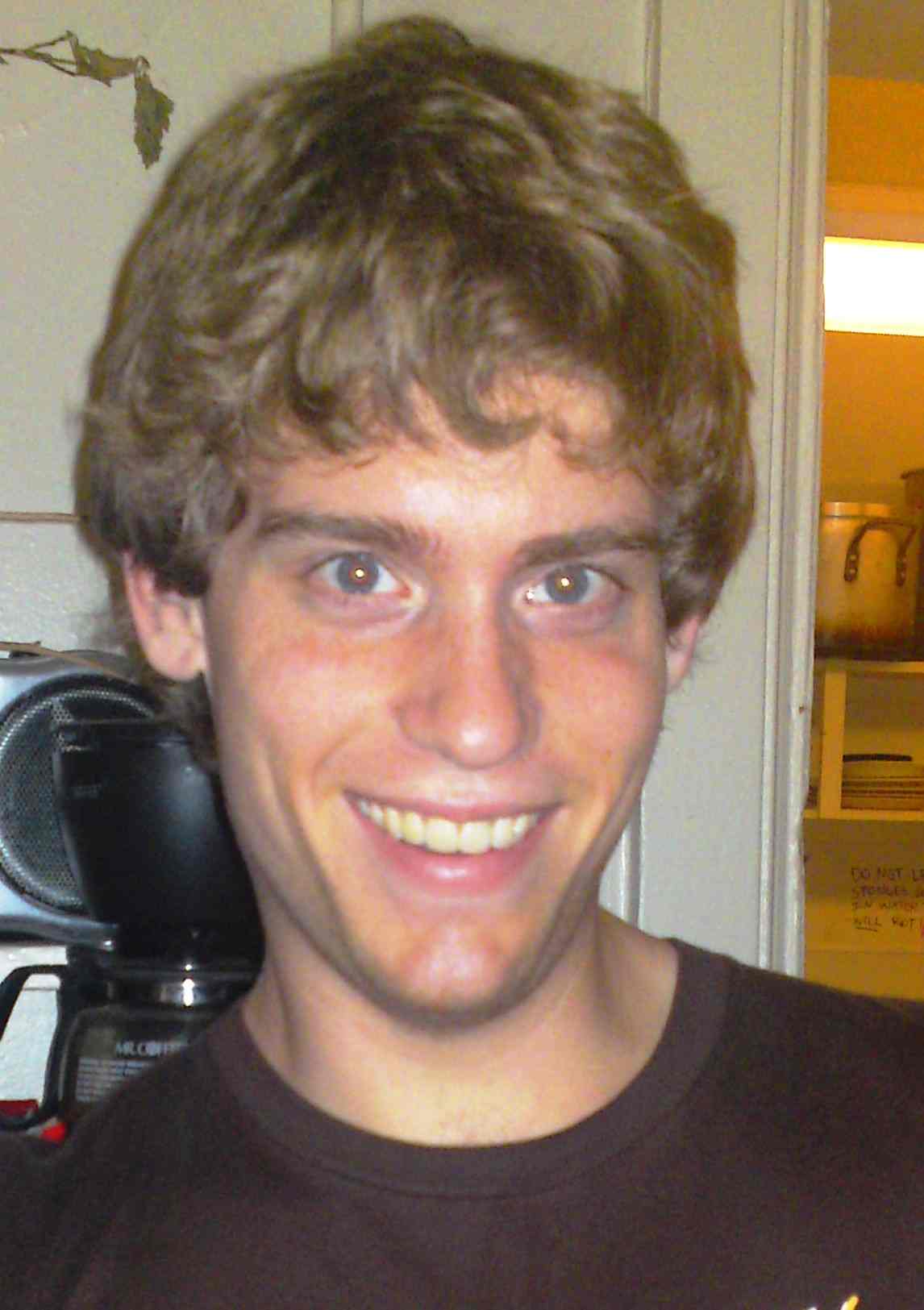
Matthew Stasiewicz
Food ScienceBS/BA: Biosystems Engineering and Philosophy, Michigan State University, 2007
MS: Food Science, Cornell University, 2010
Throughout my academic career I have been concerned with how improvements in food safety can catalyze more substantial changes in the food system, particularly by influencing governments to adopt better policies. The engineering portion of my undergraduate education focused on how better understanding of the effects of food processing could lead to less waste during production with equal safety. My philosophical study focused on the ethics of science, agriculture biotechnology, and development. Fortunately I was able to apply both these thought processes during many academic trips to Mexico where I learned how producers are integrating into a globalized food system. I came to graduate school to understand the mechanisms behind, and the methods to control, microbial barriers to food safety. My PhD work will be centered around the risk analysis and management questions that are necessary for effective food safety interventions.
While it is still too early for to identify specific goals for my IGERT research, I am interested in indentifying areas where food safety problems are real contributors to persistent poverty. In those areas, my field of food science and technology may be able to contribute unique, technical tools to what must be interdisciplinary and holistic approaches to poverty alleviation. Specifically, I anticipate working on improved mycotoxin control methods and dairy preservation or utilization as areas where technical developments could contribute substantially to the health and livelihood of small famers.
Interests: I enjoy everything involved in sharing a good meal with family and friends, from enlightened shopping, to cooking, to meaningful conversations while eating. Then I spend a lot of time running, climbing, and being outside to put all that food to good use.
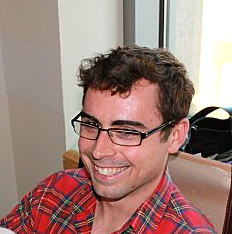
Brian Thiede
Development SociologyBA: International Relations, Bucknell, 2008
MS: Development Sociology, 2011 (Jan)
Upon graduation from Bucknell, I headed straight to Cornell. I have been fortunate enough to break up my work here with numerous intervals of travel in Latin America, North Africa, and South Asia. As an aspiring development specialist, the overarching focus of my research is to advance knowledge that can be used to make sustainable improvements in the material and social conditions of the poor and excluded. On a slightly more concrete level, my research interests fall into three categories: (a) poverty and inequality; (b) spatial dimensions of human population (migration, distribution, segregation); and (c) rural and environmental sociology.
The IGERT Program provides a unique and exciting opportunity to integrate and develop these interests in an interdisciplinary setting. Although a coherent set of research questions for my dissertation has yet to emerge, I have a general interest in understanding: (a) how social relations are reconfigured (socially and spatially) by agricultural policies and/or environmental changes related to rural development; (b) how such processes interact with social structures; and (c) how such changes and interactions affect the economic, social, and environmental outcomes of social groups.
Interests: Reading, Running, Hiking, Homebrewing.
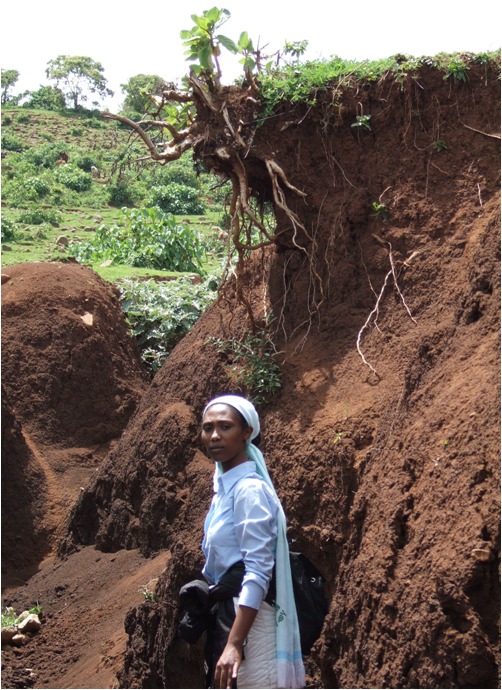
Tigist Yazi Tebebu
Biological and Environmental EngineeringBS: Land Resource Management and Environmental Protection (Concentration: Soil and Water Conservation), Mekelle University, Ethiopia, 2006
MPS: International Agriculture and Rural Development (Focus: Integrated Watershed Management and Hydrology), Cornell University, 2009
I grew up in the rural town of Motta, Ethiopia. My experiences living and working in Ethiopia have provided me a firsthand look at rain-fed subsistence farming and the rampant food insecurity that results from serious degradation and mismanagement of watershed resources. At the undergraduate level, I did my research on soil fertility, indigenous knowledge and soil and water conservation practices in the Northern Highlands, one of the areas of Ethiopia where natural resources have been severely degraded. My master’s research focused on the effects of surface and subsurface flows on gully formation. My professional work experience was with the urban agriculture development office in Bahir Dar, Ethiopia. I was actively involved with a Millennium Development Goal-focused project on reforestation and rehabilitation program of “Abay Park,” a sub watershed of Lake Tana, in the origin of Blue Nile River.
I hope my participation in the IGERT will provide me with the conceptual, methodological, and analytical tools to conduct effective and worthwhile research to combat extreme poverty and improve rural household food systems. For my dissertation research, I am particularly interested in looking at the interrelated aspects of erosion (surface as well as subsurface), nutrient transport, water pollution and its impact on community health.
Interests: In my spare time I love reading and listening to spiritual songs and stories.
- Holly Buck
- David Flannelly
- Leilah Krounbi
- Ellen McCullough
- Barnabus Natamba *
- Julianne Quinn
- Andrew Simons
- Lauren Snyder
- Djeinam Toure
- * FSPR IGERT Associate

Holly Buck
Development SociologyBA: English, University of Maryland Baltimore County, 2002
MS: Human Ecology, Lund University, 2011
After a few years working for an international mapping company as a GPS technician, and time working in journalism and teaching, I settled down in Sweden for a master’s degree in “Human Ecology: Culture, Power, and Sustainability.” As a geographer, I am interested in human-environment interactions, and as a environmentally-minded writer, I’m interested in the cultural narratives which frame our understanding of the world we live in. I wrote my master’s thesis on media representations of large-scale climate engineering projects, and remain engaged in writing about climate change more broadly.
Upon returning to the US, I worked as a geospatial humanitarian analyst and became interested in the links between resource scarcity, environmental degradation, conflict, poverty and food systems. Policy-makers all over the world are grappling with how to deal with twenty-first century challenges— e.g. climate change and access to affordable food, water, and energy— and it is my hope that this IGERT will train researchers that can provide institutions with intelligent solutions. The general themes I plan to pursue in my dissertation include interactions between climate change, food availability, and conflict, and the ecological, social, and financial effects of recent large-scale agricultural land acquisitions in East Africa.
Interests: I like maps, graphic design, writing letters, learning languages, music, aikido, rail journeys, and listening to people’s experiences.
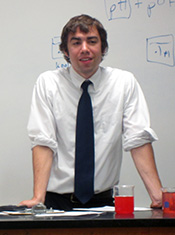
David Flannelly
Environmental Toxicology and ChemistryBA: Chemistry, College of Wooster 2010
Issues of social justice and the environment have driven both my academic and personal life. This has led me to study emerging pollutants in the Chicago watershed, indigenous campesinos in Argentina, antimicrobial agents in wastewater effluent and participate actively in gardening both on the community and personal scale (to varying degrees of success). Since graduating college I have spent two years with the Teach For America Corp in the rural Mississippi Delta teaching High School Science. My experience teaching has driven home the importance of education not only as a social justice issue, but also as a key lever in solving environmental and food systems problems. In my graduate studies I will be focusing on soil chemistry and organic matter retention and am excited by the opportunity to work collaboratively to apply research to a practical end.
Interests: I enjoy running, gardening, playing board/card games, reading, Fall/Spring days, mountains and spending time with friends.
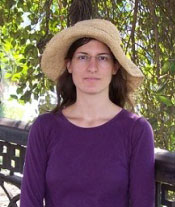
Leilah Krounbi
Crop and Soil ScienceBS: Soil and Water Science, Hebrew University of Jerusalem
MS: Desert Studies, Ben Gurion University of the Negev
My burgeoning love affair with soil began in 2005, the year I registered as a soil and water science major at the Hebrew University. Oh the delight in discovering that something so underrated and negatively-stigmatized (‘dirty’) as soil could be of such importance to human existence.
Both my undergraduate and master’s research centered on modeling soil water transport; the former project examined the validity of traditional capillary-flow models for soil water transport in hydrophobic media, while in the latter project, empirical and mechanistic approaches to modeling root water uptake were compared, with the purpose of isolating dominant system variables in the uptake process.
In an effort to apply the knowledge gained throughout my undergraduate and graduate degrees, I traveled to Haiti, where I was privileged to work alongside rural farmers in the Artibonite Mountains, planting fruit trees for an agroforestry initiative. The importance of furthering research on soil conservation, fertility, and regeneration for the strengthening of vulnerable agrarian economies, was never as apparent to me as when walking along the steep, cropped hills in rural Haiti where the soil is eroded to the extent that farmers seed directly into the calciferous parent material.
Thus, I hope to spend these upcoming years as a doctoral candidate researching novel methods for increasing soil nutrient levels and restoring degraded soils. I am interested in processes by which soil amendments such as compost and organic matter, become soil, and the chemical and structural stability of the resulting product. Other factors relevant to the success of small-holders, which I hope to incorporate into my research, are improved household and farm resource management, and marketing strategies offering small-holders a larger customer base.
The Food Systems and Poverty Reduction IGERT program is the optimal framework within which to pursue such a project; the emphasis on multidisciplinary collaboration will afford me the academic resources to more clearly define cause-and-effect mechanisms leading to the decline of agriculture in subsistence-farming communities, and address possible strategies for making small-scale farming a viable livelihood.
Interests: The Middle East, Semitic languages, nomadic pastoralism, and farming are all of great interest to me. In addition, I enjoy preparing and eating home-cooked meals, a good story, and solitary walks.
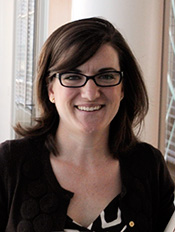
Ellen McCullough
Applied Economics and ManagementBS: Earth Systems, Stanford University, 2003
MS: Earth Systems, Stanford University, 2004
I have been a PhD student in the Dyson School of Applied Economics and Management since August 2011. My research focuses on the productivity of smallholder-based agriculture in Sub-Saharan Africa. Most recently, I worked as an Associate Program Officer in the Agricultural Development program at the Bill & Melinda Gates Foundation. I developed a portfolio of grants focused primarily on generating better household level survey data to guide policies and investments. I also worked to enhance the nutrition impacts of the foundation’s agriculture-focused investments. Before joining the foundation, I worked in the Agricultural Development Economics division of the Food and Agriculture Organization in Rome, Italy. I led a cross-country research project on organizational changes in food systems and the impacts on smallholder farmers. I edited a book synthesizing the results of this research (The Transformation of Agri-Food Systems: Globalization, Supply Chains and Smallholder Farmers).
I am honored to be a part of the food systems and poverty reduction IGERT. Like the major issues that motivate my pursuit of a PhD, my research interests naturally span multiple disciplines including social sciences, natural sciences, and human health. In my free time, I enjoy fly fishing, trail running, backpacking, live country music, and cow-calf ranch operations.
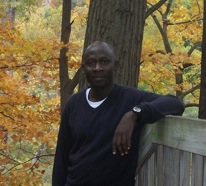
Barnabas Natamba
International NutritionBS: Food Science and Technology, Makerere University, Kampala
MPH: Hebrew University, Jerusalem
My interests in the Food Systems and Poverty Reduction IGERT program stem from my experiences living and working in Uganda, studying previously in Israel and currently in the US. These experiences are informed by my training, previously in food science and public health and currently in international nutrition. Although it’s still early to zero in on a specific topic for my PhD dissertation, I am interested in studying the growth and development of HIV exposed and unexposed children in Uganda and the role smallholder farmers can play in the development of interventions to reduce childhood undernutrition. It’s my desire to design, test and rollout medium to long-term nutrition interventions that maximize the use of homegrown and nutritionally diverse diets to ensure that children exposed to HIV achieve their maximal growth and development potential. I hope that the use of locally procured foods, and formulating these to prevent malnutrition, will improve rural food systems through increasing incomes of smallholder farmers by ensuring a steady market for their produce.
Interests: I enjoy meeting and talking to new people, hiking, and photography.

Julianne Quinn
Civil and Environmental EngineeringBS: Earth and Environmental Engineering, Columbia University, 2011
As an undergraduate, I spent a summer volunteering in Urubamba, Peru, constructing and distributing water filters to local residents. During my time in Urubamba, I saw problems of climate change-induced water scarcity and water quality first-hand, as their glacial water source is rapidly retreating and heavily polluted, resulting in poor public health. Observing the associated environmental and health impacts of water contamination in Peru motivated me to pursue a career studying water supply planning and management options in the developing world. In order to begin such a career, I felt I needed to further my education and began a PhD program in Environmental and Water Resources Systems (EWRS) to study ways to manage water resources among multiple users while maintaining or improving water quality.
As an environmental engineer, though, I only know a piece of the considerations that must go into the decision-making processes regarding the management of water resources. Through participation in the FSPR IGERT, I look forward to learning how to incorporate and consider not only hydrologic factors, but also social, economic and agricultural factors, in developing water planning strategies aimed at improving the quality of living in the developing world in order to reduce human suffering. I do not have a concrete dissertation topic yet, but I hope my research will be useful in promoting more sustainable and equitable water management strategies in the developing world.
Interests: Running (steeplechase!), hiking, eating and sleeping.
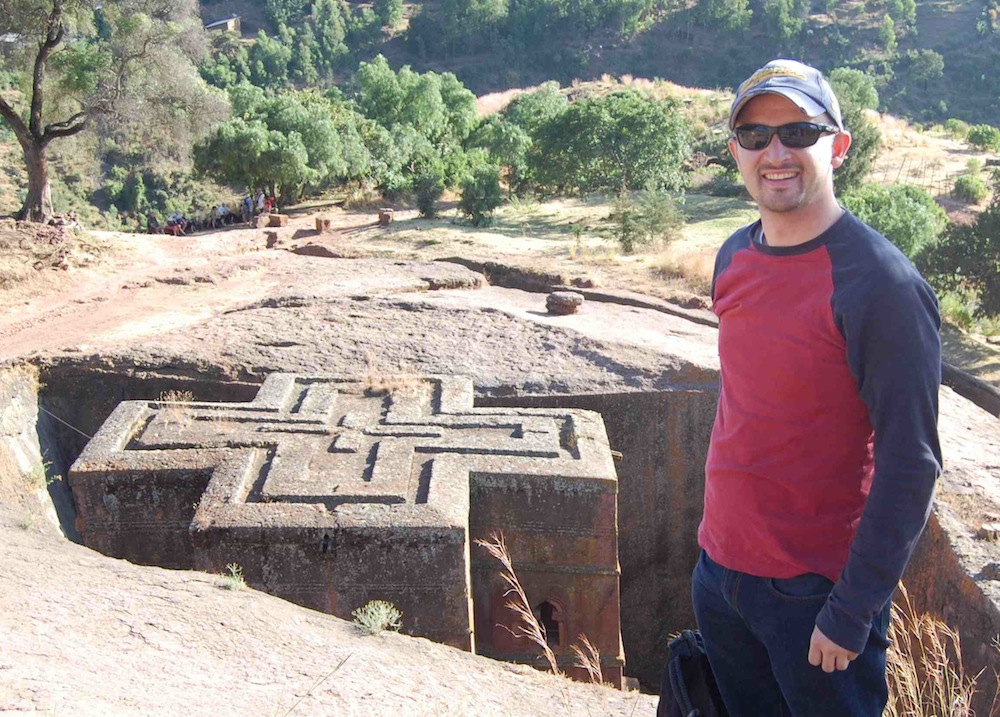
Andrew Simons
Applied Economics and ManagementBS: Biology, Taylor University, 2001
MPA: International Development, Harvard University, 2004
I have worked in senior level NGO management positions since graduating from a Masters degree in 2004. In my capacity as both a country director and director of programs I have overseen various relief and development programs that have touched the lives of hundreds of thousands of people. My most interesting experiences have included the five years I worked in Ethiopia having the chance to design, implement and oversee many types of projects including: health and HIV, water and sanitation, food security and agriculture, livelihoods, and working on linkages for rural cooperatives to reach urban markets.
I would like to tailor my IGERT experience to allow me to better engage both the NGO sector and the academic sector to find innovative solutions that help the rural poor. All too often, I have observed that NGOs and academics do not work together closely enough. The potential benefit from the academic side is in creating new ideas for potentially groundbreaking interventions that help the poor. While the benefit of NGOs is that they have credibility on the ground in areas where researchers would like to see their ideas implemented. I have personally seen the difficulty these two sides can have in working together. Researchers often do not understand that the pace of NGOs’ implementation schedules often do not lend themselves to data gathering to the level of rigor a researcher wants. NGOs, on the other hand, often do not understand the needs of controlled experimental design to learn the benefits of a given intervention. I have observed various potentially useful collaborations between academics and NGOs fall apart mostly because these two parties do not completely understand the needs of the opposite party.
The focus of a multi-disciplinary curriculum that the IGERT offers excites me as that multi-disciplinary focus will give me the tools to engage diverse stakeholders with the aim of bringing together the NGO and academic sectors into closer collaboration around the complexities of rural poverty to create innovative lasting solutions.
Interests: When I am not playing with my beautiful and energetic three year old daughter, Isabella, I can be found avidly following baseball (sometimes quite difficult to do from Africa) and I have a budding interest in bird-watching (much easier to do in Africa). As we prepare to move back to the States, I am looking forward to high speed internet, reconnecting with friends, and Mexican food.

Lauren Snyder
Ecology and Evolutionary BiologyBA: Ecology and Conservation Biology, Boston University, 2011
As an undergraduate, I was involved with research focused on the agricultural ecosystem services provided by bats. As part of this study, I spent a summer on an organic pecan orchard in rural Texas mist-netting and radio-tracking bats. In addition to expanding my knowledge of bat ecology, I also spent a good deal of time in an organic garden plot where the landowners raised most of their produce. Studying the connections between wildlife and agriculture in Texas motivated me to pay attention to the origins of my food and the impacts its production can have on the environment.
Currently, I am involved with a project in Uda Walawe National Park, Sri Lanka studying human-elephant conflict in rural farming communities. My ambition is to work directly with farmers to investigate agricultural practices that will alleviate confrontational relationships between humans and wildlife, and preserve our natural resources. I am eager to extend this line of study from Asia to Africa, as there are many interesting parallels between the two regions. I am particularly excited about the interdisciplinary IGERT program as it will be an excellent opportunity for me to incorporate sociological, economic, and political perspectives into my research.
Interests: I spend much of my free time practicing Natural Horsemanship. Outdoors is my favorite place to be whether I am horse-back riding, running, hiking, or just reading a book. I am very passionate about food and enjoy cooking, especially for my family and friends. I am always up for an adventure and love to travel.
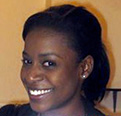
Djeinam Toure
NutritionBS: Global Nutrition, McGill University, 2010
Upon graduation, I moved to Mali to work on an integrated agriculture and nutrition intervention. Prior to this, I had mostly been involved in supplementation campaigns and efforts to manufacture appropriate complimentary foods. Once I became involved with agriculture, I was encouraged to pursue further study in it by the immense potential to impact food security and improve nutrition in a preventative rather than curative manner.
From this my research interests took form. Although it is still early to tell, I am hoping to study the linkages between agriculture and nutrition, as well as related implementation issues. Specifically, I am interested in agriculture’s impact on women’s care-giving capacities and understanding the impact pathway through which an agricultural intervention acts to impact nutrition.
Interests: In my spare time I love to travel, run and listen to good music, all of which are enriched by the company of friends and family.
- Student One
- Student Two
- Student Three
- Student Four

Student One
PhD FieldBA/BS: Lorem ipsum dolor sit amet
MA/MS: Lorem ipsum dolor sit amet.
Current Research: Lorem ipsum dolor sit ametLorem ipsum dolor sit ametLorem ipsum dolor sit amet.
Interests: Lorem ipsum dolor sit ametLorem ipsum dolor sit ametLorem ipsum dolor sit amet.
Email: Lorem ipsum dolor sit amet

Student Two
PhD FieldBA/BS: Lorem ipsum dolor sit amet
MA/MS: Lorem ipsum dolor sit amet.
Current Research: Lorem ipsum dolor sit ametLorem ipsum dolor sit ametLorem ipsum dolor sit amet.
Interests: Lorem ipsum dolor sit ametLorem ipsum dolor sit ametLorem ipsum dolor sit amet.
Email: Lorem ipsum dolor sit amet

Student Three
PhD FieldBA/BS: Lorem ipsum dolor sit amet
MA/MS: Lorem ipsum dolor sit amet.
Current Research: Lorem ipsum dolor sit ametLorem ipsum dolor sit ametLorem ipsum dolor sit amet.
Interests: Lorem ipsum dolor sit ametLorem ipsum dolor sit ametLorem ipsum dolor sit amet.
Email: Lorem ipsum dolor sit amet

Student Four
PhD FieldBA/BS: Lorem ipsum dolor sit amet
MA/MS: Lorem ipsum dolor sit amet.
Current Research: Lorem ipsum dolor sit ametLorem ipsum dolor sit ametLorem ipsum dolor sit amet.
Interests: Lorem ipsum dolor sit ametLorem ipsum dolor sit amet. Lorem ipsum dolor sit amet.
Email: Lorem ipsum dolor sit amet


